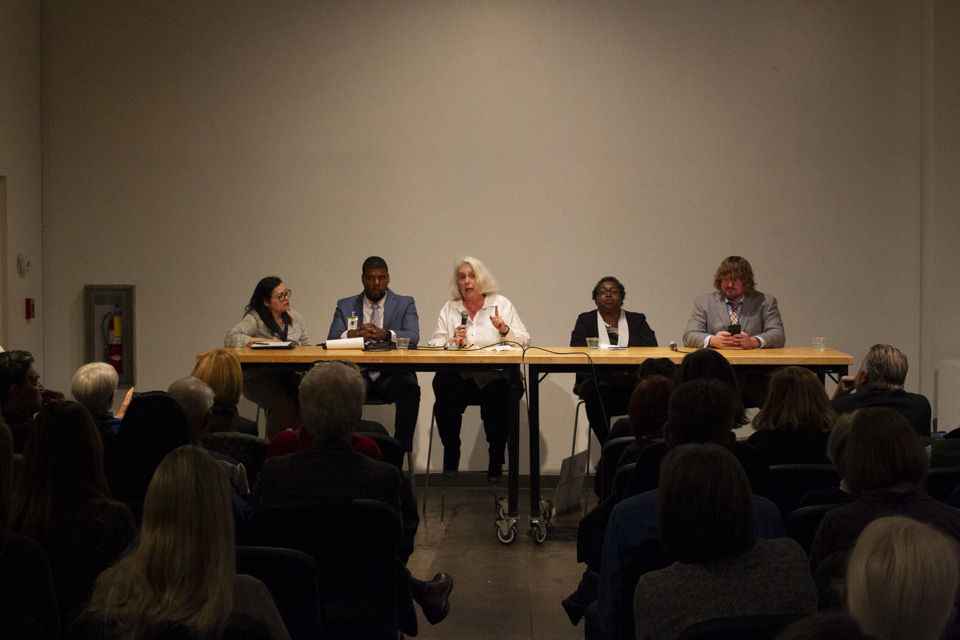Panelists Weigh in on Georgia’s Past, Athens’s Future Elections
Panelists Weigh in on Georgia’s Past, Athens’s Future Elections
By Foster Steinbeck | The Red & Black | January 29, 2020
Other Pages
When he first moved from being a member to leading the board on Jan. 21, Athens-Clarke County Board of Elections Chairman Jesse Evans was surprised to learn only two of Athens’ 20 polling locations had enough electrical infrastructure to power each of the state’s new Dominion voting machines. Voters will first use the new machines in the upcoming presidential primary on March 24.
“I am frustrated because we are very close to the elections,” Evans said. “If we don’t have the electrical capacity for these machines, I don’t understand how we’re going to be expected to utilize those machines.”
Evans spoke as a panelist to an audience gathered inside Ciné Lab on Jan. 28, as the Athens American Constitution Society Lawyer Chapter hosted a panel to discuss voting in Georgia and screened “Suppressed: The Fight to Vote,” a documentary about voting issues in Georgia’s 2018 gubernatorial election.
The panel was moderated by former Georgia House District 117 Rep. Deborah Gonzalez and featured Christopher Bruce, American Civil Liberties Union of Georgia political director; Jeanne Dufort, Coalition for Good Governance volunteer; Linda Lloyd, Economic Justice Coalition executive director; and Evans.
Evans said he and Board of Elections members Mokah-Jasmine Johnson — who’s also running for state House District 117 — and Willa J. Fambrough have created a back-up plan — “Plan B” — to use paper ballots to fill voting booths don’t have an electronic voting system and to replace the electronic voting systems if “something goes wrong with the machines.”
Additionally, Evans expressed concern over the early voting locations during the 2018 election — three downtown locations and ACC Library on Baxter St. Evans also discussed long lines at voting stations that serve two separate voting districts, called merged polling stations.
“That can be a form of suppression,” Evans said. “Some people can’t wait in long lines. People have physical issues, or they have to work.”
ACC has four merged polling stations, Evans said — Gaines Elementary School, Timothy Road Elementary School, Whitehead Road Elementary School and Whit Davis Elementary School.
The panel launched their dialogue from the documentary, which highlighted the issues surrounding provisional ballots, student registration, Georgia’s “exact-match” law and long wait-times to vote in Georgia’s 2018 gubernatorial election, citing those problems as examples of voter suppression.
Dufort expressed her concern of “electronic voter suppression,” warning about the vulnerabilities of Georgia’s new voting system.
“The explosion of electronics in our elections is creating a national crisis, in confidence and in our reality,” Dufort said.
In describing problems facing minority voters, Bruce recalled their past struggles in earning the right to vote, citing former restrictive voter requirements, poll taxes and literacy tests.
“[Voter suppression] comes from a long history of what Georgia has been going through. It's only when the people demanded change, and things actually do change,” Bruce said. “I'm just here to tell you that you have the power, and not only that, we're here to help.”
In his closing statement, Evans called for an audit of the Board of Elections, as well as urging people to come to the Board’s meetings and to volunteer as poll workers in the upcoming election.
“For better or for worse, I’m an optimist,” Evans said. “We’re going to do well. We’re going to continue fighting and doing what we need to do to make these elections serve the people.”

On Jan. 28th, the Athens American Constitution Society Lawyer Chapter hosted a panel to discuss voting in Georgia and screened "Suppressed: The Fight to Vote," a documentary about voting issues in Georgia's 2018 gubernatorial election.
(Foster Steinbeck/Staff)